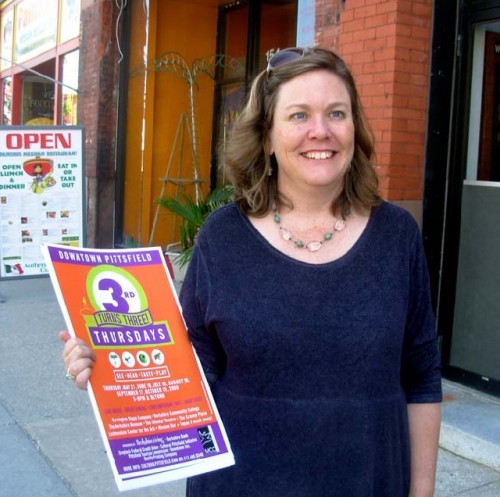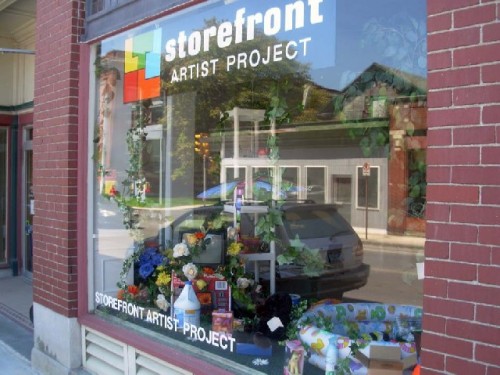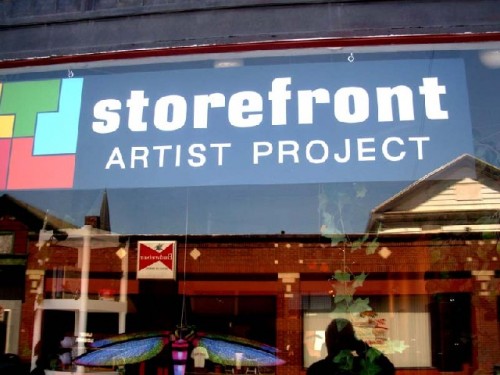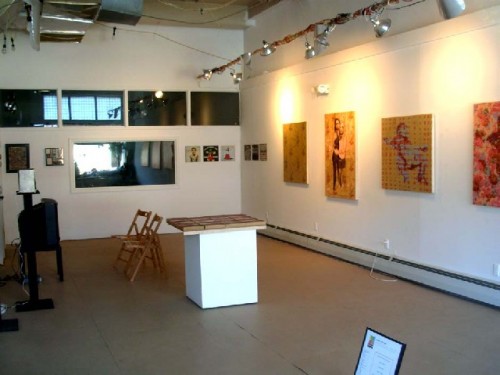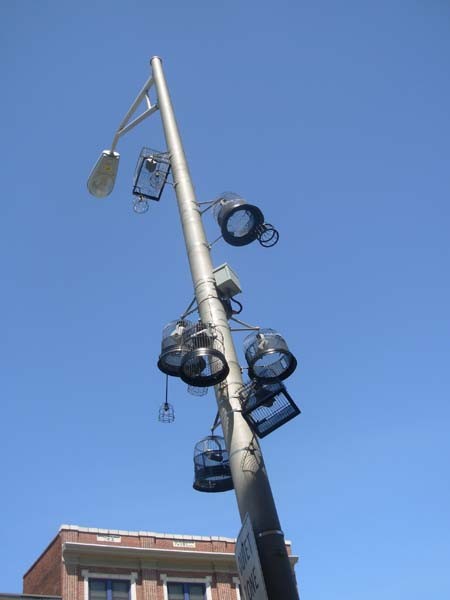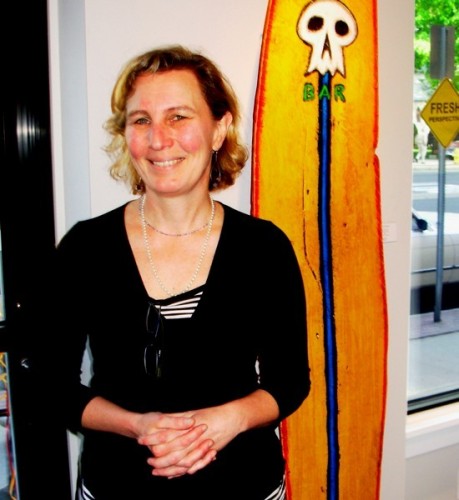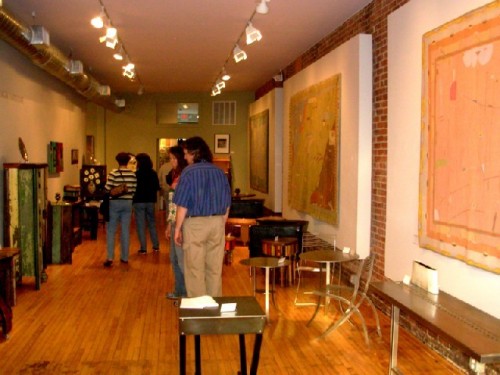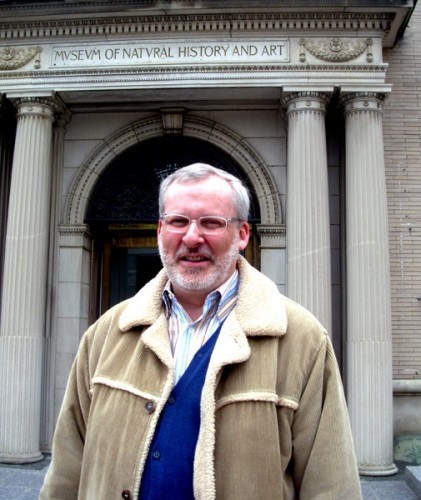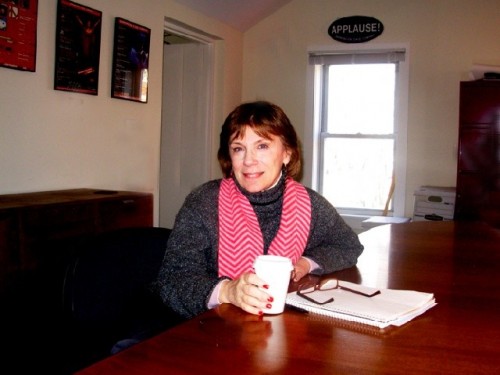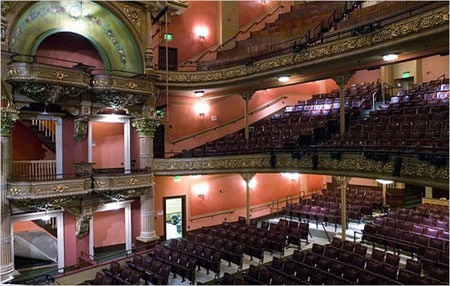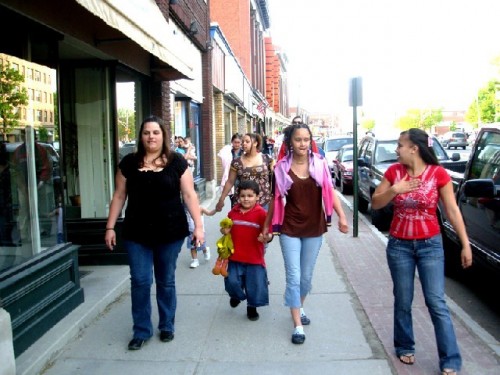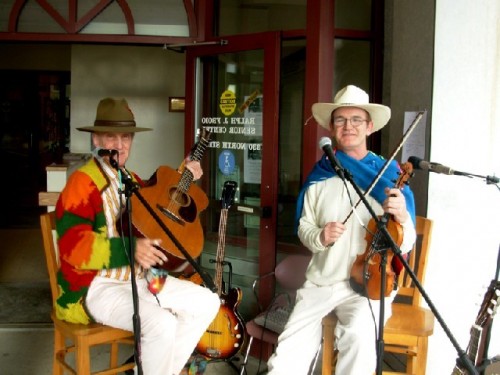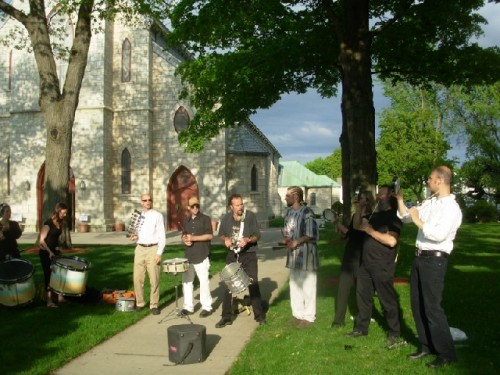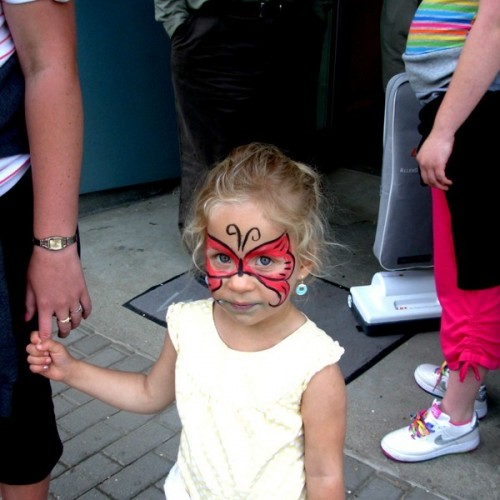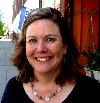Megan Whilden Director of Cultural Development for Pittsfield
Making the Arts a Focus for Economic Recovery
By: Charles Giuliano - May 20, 2009
There was a flurry of activity in the Lichtenstein Center for the Arts at 28 Renne Avenue in downtown Pittsfield. Several local teachers were taking a break with coffee and donuts during the installation of an annual exhibition of works by students. We noted that a grouping of several works seemed influenced by the famous Obama poster by Shepherd Fairey. The teachers responded enthusiastically that the works had been inspired by a field trip to the Institute of Contemporary Art in Boston.
The exhibition was due to open on Thursday as a part of the successful, city wide event "Third Thursday" which will launch its season just prior to Memorial Day Weekend. The office was buzzing with activity involving the upcoming high season for arts and culture in the Berkshires.
We dropped by to meet with Megan Whilden, the charming and dynamic Director of Cultural Development, who, working closely with Mayor James M. Ruberto, has been a crucial architect of a complex and successful strategy to revitalize a city which was hit hard when General Electric phased out some 10,000 jobs during the late 1980s.
In conversations with artists who grew up in the area they recall cruising North Street on Saturday night when it was a thriving matrix of movie theatres, bars and restaurants. There are similar stories of how during the three shifts of Sprague Electric in North Adams there were crowds on Main Street that resembled Times Square on New Year's Eve.
When the factories shut down the Northern Berkshires fell on hard times. It has taken guts and imagination to see the potential of all that empty factory and retail space. This week Mass MoCA in North Adams, on the sprawling, 14 acre, former Sprague campus will celebrate its 10th anniversary with a ball. Similarly, in the past few years Pittsfield has reconfigured itself, largely through the vision and leadership of Mayor Ruberto, as a destination for the arts which is proving to be a magnet for new business.
Not that long ago Pittsfield was just a pass through between the cultural activities of Southern Berkshire County, notably Tanglewood and Jacob's Pillow, and the cluster of arts in Williamstown including the Clark Art Institute, Williams College, and, during the summer, the Williamstown Theatre Festival. That has changed as Pittsfield has also become a destination for the refurbished Colonial Theatre, the renovated Berkshire Museum, Barrington Stage Company, Storefront Artists Project, Ferrin and Zeitgeist Galleries, and a six screen, state of the art, movie complex which is targeted to open in December.
It was difficult for Whilden to meet with us but, truth is, she is so flat out busy that there never really is a good time. As we walked from the office to Dottie's, a café and hangout, she multi tasked by pointing out the public arts works along the way and dropped into some shops to leave posters for the popular Third Thursday events. She asks everyone to take some posters and flyers including us. Walking along she seemed to be constantly taking cell calls and texting. Even during lunch, when she answered our questions over a Greek salad, she was multi tasking while graciously filling us in on what's happening in Pittsfield. The story of the turn around of the city from the depth of depression is so successful that it is a template with national and international resonance.
"This is really a team effort involving great people bringing together arts organizations, business, and city government" she stated with a megawatt smile that lit up the café. We soon discovered that she is a celebrity as folks came over to greet her and inform us of the great job she is doing. "There is nothing that my office can do on its own."
A native of California she spent two years in New York before moving to Sandersfield a town so small and obscure that it has t-shirts that say "Where the hell is Sandersfield." She ended up in Pittsfield in 2003 having met Maggie Mailer, the founder of the Storefront Artists Project, in 2002. The initiative of Mailer's vision played a crucial role in a turnaround and new focus for the city.
During the time of economic depression for the region there was little opportunity for young people. After college they moved on. The Mayor was one of those individuals. After earning an MBA he worked in sales and business in Chicago, San Francisco, and Dallas.
"He got to see what is attractive about those cities" Whilden commented. "He came to understand the importance of the arts and culture as a vibrant component of an exciting city. He realized that you can't have a successful city without the arts. Pittsfield had hit rock bottom and his Dad told him to come back and do something for the city.
"Nothing is more powerful than a hometown guy who comes back and sees his town with fresh eyes and new ideas of how it can improve. Because of having spent 30 years in business and sales he had a can do approach. He went to Boston and Beacon Hill to meet business leaders and politicians to pitch Pittsfield as a rising city. He set a bold goal to draw a half million annual visitors to downtown Pittsfield and we are now half way toward that target. There are 24 new businesses that have opened in the past four to five years."
When Ruberto was elected, in the fall of 2003, he was inspired by the Storefront Artists Project to form a committee of volunteers, including Mailer, to develop an arts office and job description. Whilden remarked with candor that Mailer insisted on the title Office of Cultural Development so it has the acronym of OCD which suggests a reference to Obsessive Compulsive Disorder. It is not far from the mark in describing Whilden's 24/ 7 approach.
If commitment and charisma are the defining qualities Pittsfield is well on its way to becoming one of the outstanding paradigms for urban redevelopment in America. But the challenges have been truly daunting. It takes enormous energy to reverse the inertia of a city that was all but dead in the water, a kind of sprawling, gutted, beached whale.
But this is precisely the target of opportunity for artists, visionaries and entrepreneurs. It also takes synergy and cooperation as nobody can stand alone to accomplish their dreams. The starting point was all that empty real estate in the downtown as well as surrounding residential areas. The mantra of Whilden to artists is to "buy now." She stated that "Six years ago there was a lot of really cheap real estate. Not now. But there is a lot that is still affordable. A couple of years ago I bought a two family home for $141,000. You can get a fixer-uper for $100,000 and less. Artists tell me they are looking for lofts which are less available. But I tell them to buy affordable houses, knock out walls, and renovate garages as studios."
There is a familiar scenario in which artists move into blighted loft areas like first Soho, then Chelsea, move on to Brooklyn, then Newark only to get priced out by development. It was over for Soho when Victoria's Secret moved in. A common signifier is Starbucks as time to move on. The only way to avoid relocation is to buy in and plant roots. Often that is a tough challenge for young artists who get forced out by increased rent or rising property taxes.
We asked Whilden whether this is precisely the fate of the Storefront Artists? Initially, they were offered free space in those vacant stores. She saw it differently stating that "Right from the beginning there was the understanding that those were ephemeral, temporary studios. The artists who lived in the area liked those downtown spaces." As we walked along North Street she pointed to the second floors of several commercial buildings which have been taken over as artist studios. "From the very beginning we have encouraged artists to buy and invest" she said. Part of making that possible is the "Assets for Artists" program which entails matching funds for low and moderate income artists to cover professional expenses and invest in real estate. She speculates that there are now some 500 artists in and around Pittsfield. Add to that another growing community of artists in North Adams.
A key factor in the turnaround for Pittsfield was the $ 10 million "Economic Development Fund" which was established when GE left. Whilden describes it candidly as a "divorce settlement" in what had become a dysfunctional relationship. Over the years GE has used its muscle to prevent other corporations from attempting to become established in its town. Pittsfield Was GE. Until it was over. Mayor Ruberto decided to make a third of that fund targeted for arts and culture. That's always a tough sell when, in hard times, there are demands for schools and health care.
In the development model advanced by Mayor Ruberto arts and culture would drive other investment. Part of the mandate, expressed by Third Thursdays, is that the arts are for everyone. The various arts presenters, for example, all have programming focused on school groups and families. There are a lot of ideas to make the arts accessible and affordable. The Beacon Cinema Project which is being initiated by Richard Stanley of Triplex Cinemas of Great Barrington is a part of that vision. It is taking over a historic downtown site and will feature a lobby designed like a 1930s movie palace. The complex will program quality first run and independent films. It is just another component in providing traffic for the downtown area. Whilden also points with pride to the fact that the downtown is luring small business and not national chains which move on when the spread sheets are unfavorable. In general malls are dying representing an outmoded business model.
While Whilden radiates positive energy there is the dark cloud of the current recession; the fastest and steepest economic decline since the Great Depression. Last summer was tough with a declining economy, crappy cold and rainy weather, as well as, gas a $4 a gallon. This season may be even more challenging. Over the winter season just about all of the arts organizations initiated budget cuts that averaged 20% including hiring freezes, unpaid furloughs, and layoffs.
In this tough economic climate what does Whilden see that will be different for Pittsfield? "What we are trying to do is well coordinated marketing with joint events. We play well together and have been for some time. The harder you work the luckier you get. It's like in the theatre when, after ten years of hard work, someone becomes an overnight success."
Part of the strategy is getting the word out. Whilden's office sends out a weekly e mail blast promoting ten events. This entails selecting from an average of some 20 events. The blast, which goes out to some 5,000 subscribers, tries to balance what is going on and give exposure to a wide range of presenters and events.
"Story telling is key" she said. "In the current economy we are in a good position as we have the habit of working well together. We are promoting Pittsfield as a cultural destination and supporting our artists, arts organizations, and creative businesses. Nothing we do is pre fab. We build from the ground up. The Mayor likes to refer to me as the manure providing the conditions to make things grow." Walking back to the office she said that for Pittsfield "Change is the only constant."

